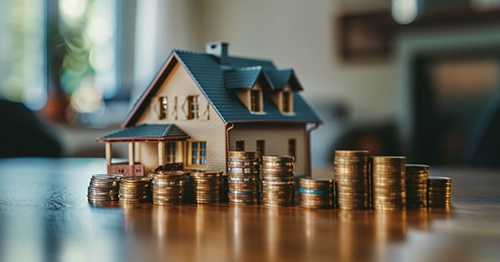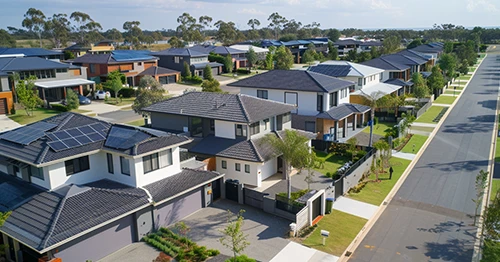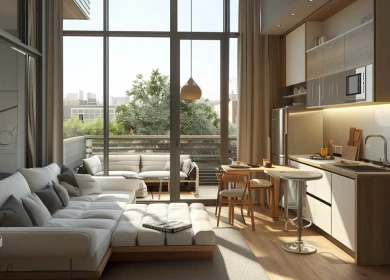Updated: 29 May, 2025
There has been a series of speculations over where the property market is heading in these uncertain times. Consecutive rate hikes have limited borrowing capacity and increased borrowers’ monthly repayments. The combination of falling property values and rising interest rates has left people wondering whether it’s a good time to buy a home or not. Here are some expert takes on the answer to that question and what to expect next.
What Is Happening Now?
The Reserve Bank of Australia (RBA) has raised the cash rate for the fifth time in five months, taking it to 2.35%. This was the fourth 50-basis-point hike of the year.
The consecutive rate hikes have cooled off a hot property market, reducing borrowing power and smashing consumer confidence. The latest report published by the Australian Bureau of Statistics stated that the average price of dwellings fell by $18,900 in the June quarter. CoreLogic data mentioned that Sydney and Melbourne were among the worst hit markets, with median dwelling prices falling to 7.4% and 4.6%, respectively, from their peaks. The Commonwealth Bank of Australia (CBA) forecast that Sydney and Melbourne’s house prices could fall by about 11% this year and would reach an 18% decline by the end of 2023.
The spring market looks unlikely to take a bounce, with sales volume expected to go down compared with previous years, although CoreLogic states that auction listings have picked up in recent weeks and preliminary clearance rates have reached 62.5%.
How High Will Interest Rates Go?
Home Loan Experts founder Otto Dargan predicts the cash rate will end up at around 2.85% which aligns with the prediction made by AMP Chief Economist Dr. Shane Oliver. He said that if the RBA doesn’t slow the pace of rate hikes now, it risks recession.
Reserve Bank of Australia (RBA) governor Philip Lowe has hinted that the pace of interest rate rises will soon slow but moves will be guided by inflation and the labour market. On 6 September, the RBA advised inflation would remain around 7% to 8% this year before dropping to 4% next year (which is still above the target band – 2% to 3%). What this means for variable interest rates, Home Loan Experts CEO Alan Hemmings said, is they will land somewhere around 5.5% and fixed rates will probably not change too much from where they are now (some are at 6%).
Will House Prices Drop In 2023?
The chance of the RBA cutting the cash rate as early as next year is extremely small; with Lowe already hinting that further rate rises are needed to bring inflation on track. This means bigger price falls are assured until next year.
Many economists are predicting national house prices could fall by between 15% and 25% over the next couple of years. Hammings predicts that as long as the RBA doesn’t put the brakes on its aggressive interest rate rising, this correction in the property market is not going to stop. The trend can be expected to continue until spring next year or it will likely be 2024.
What Trends Are Coming That May Not Be Obvious?
First-Home Buyer Predicaments
Dargan pointed out that there are a lot of first-home buyers who are seeing an opportunity to get into the market; however, their borrowing power is lower than it was six months ago. This means some people are getting pre-approved only to find that the lender won’t give them as much as they were initially approved for when they find a property. Hammings further explains that the reduction in borrowing power is made worse by rising construction costs. CoreLogic found that national residential construction costs increased 10.0% over the 12 months to June 2022. Due to these constraints, the production of new dwellings is expected to incur delays.
Investor Influx
Property is not only shifting from a sellers’ to a buyers’ market but also from an owner-occupier haven to an investment market. An increase in investor purchases shows that investors are seeing the current situation as an opportunity. Dargan asserted that one reason for this is because rents are rising fast and interest is tax deductible, so investors are not affected as much as homeowners. Secondly, some homebuyers have decided to buy an investment property instead of a home and plan to move into it when they can afford to do so. Investors also often prefer to buy when it’s a buyers market as a long term investment strategy. If investors can afford to get loans, the downturn in property prices and upswing in rental yields makes it a safe environment for them to invest.
Queensland’s Property Outlook
The changes in Queensland’s land tax law are likely to reduce the number of interstate investors buying in Queensland. Dargan explained, “This will be a win for homebuyers and a loss for renters, as it will cause the rental market to tighten.” It is causing investors to sell their properties in Queensland, which will put downward pressure on house prices.
Subtle Change In Discharge Process
The banks have benefited from a boom in lending over the last two years but now they’re competing for a bigger slice of a smaller pie. As the rates have soared, we have seen a lot more people looking to check the interest rate on their mortgage and negotiate or refinance to a better deal. Hemmings adds, “Lenders have recognised this and are tightening their discharge processes. Two of the big four Banks now require the customer (or broker) to contact them prior to completing the refinance. They are selling it as a service improvement but it gives them more time to try to retain the customer.”
Is A Housing Market Crash Ahead Of Us?
Most economists believe it’s not going to happen because there are many factors other than interest rates that affect home prices; for example, household income, unemployment, international migration and financial conditions. The good side is that all other factors are strong. Unemployment is at a historically low level, wages are growing, household balance sheets are strong and the economy is still stable and growing. Housing market as a whole is showing no sign of distress, which means most sellers are not being forced into sales at a loss. These factors suggest that, while property price recovery might take some time, a crash ahead is unlikely.
How Can A Homebuyer Or Investor Stay Ahead Of The Trends?
Potential homebuyers can take advantage of rising interest rates:
-
- The falling home prices result in lower mortgage repayments.
- If you can just hang in with repayments until rates start to cool, the decline in housing prices and home loan sizes will start to have a downward impact on the size of repayments.
- The property prices are expected to rise once inflation is on track so if you bought for less now, you may end up with better value later.
Great opportunity for investors:
-
-
- The rising interest rates have caused rents to soar.
- With property prices falling and rents rising, a smart investor can benefit from the current environment.
- The rental market is extremely tight, with vacancy rates around 1% or lower across many parts of Australia.
- Tenants are looking for affordable homes so the demand for medium-to-high-density housing is increasing. Some investors might see a big opportunity.
-
Should I Still Buy A Home?
The best time to buy a home is always subjective, depending on your circumstances. With property prices falling now, buying sooner is better if you can afford to do so.
If you keep waiting for the right time to buy, you could:
-
-
-
- Lose the opportunity of buying your dream house
- Miss taking advantage of the falling property market
- Be priced out of properties in the near future that you can afford now
-
-
Are you still sceptical about whether you should buy a home now or wait? Home Loan Experts’ mortgage brokers will help you make right decisions. Call us on 1300 889 743 or enquire online today.





